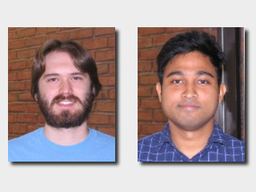Location
Engineering : 027
Date & Time
September 26, 2018, 11:00 am – 12:00 pm
Description
| Session Chair: | Maria Deliyianni |
| Discussant: | Dr. Matthias Gobbert |
Speaker 1: Carlos Barajas
- Title
- CPU, GPU, and Big Data Clusters in the UMBC High Performance Computing Facility
- Abstract
- The UMBC High Performance Computing Facility (HPCF) is the community-based, interdisciplinary core facility for scientific computing and research on parallel algorithms at UMBC. Started in 2008 by more than 20 researchers from ten academic departments and research centers from all three colleges, it is supported by faculty contributions, federal grants, and the UMBC administration. Funded by the third successful MRI grant from the National Science Foundation to HPCF, new CPU, GPU, and Big Data clusters with state-of-art processors and high-performance interconnects are being introduced presently.
- This talk introduces the new components that will be available to the campus community soon.
Speaker 2: Reetam Majumdar
- Title
- Statistical formulations of climate models and the fingerprint method of detecting climate change signals
- Abstract
- One of the primary goals of climate research is to determine the causes behind historical global warming and establish how much of climate change can be attributed to human activity. A major difficulty in detecting the changes to climate systems due to human activity arises due to the natural climate variability often drowning out climate change signals in our observed data.
Fingerprint procedures try to express climate data in terms of low dimensional signal patterns built to maximize the signal-to-noise ratio. Levine, A.R., & Berliner, L. M. (1998) in their paper “Statistical Principles of Climate Change Studies” outlined the fingerprinting approach and showed it to be analogous to regression and hypothesis testing procedures that we use in classical statistics. - We look at some statistical formulations of climate change models presented in the paper and go over the sections discussing detection as a statistical hypothesis testing problem.
Tags:
